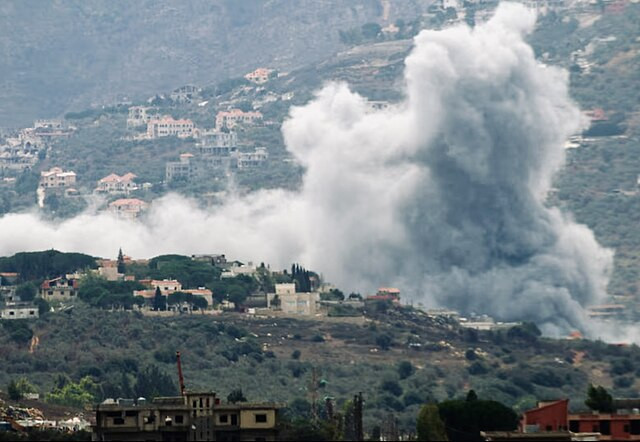Israel launched a new wave of airstrikes on southern Lebanon early Wednesday, marking the third consecutive day of intensified military action against Hezbollah targets. The escalation comes hours after Hezbollah confirmed the death of a senior commander, Ibrahim Qubaisi, in an Israeli airstrike on Beirut.
Lebanese media reported that the Israeli strikes began around 5 a.m., targeting several areas in the country's south and causing unspecified casualties. The Lebanese Health Minister, Firass Abiad, told Al Jazeera Mubasher TV that the offensive since Monday has resulted in 569 deaths, including 50 children, and wounded 1,835 people.
Hezbollah announced it had launched a rocket targeting Mossad headquarters near Tel Aviv in retaliation. Sirens sounded in the Israeli city early Wednesday, prompting residents to seek shelter. The Israel Defense Forces (IDF) later stated that the missile was intercepted, with no casualties or damage reported.
The intensifying conflict has raised international concerns about a broader regional war. United Nations Secretary-General António Guterres warned, "Lebanon is at the brink. The people of Lebanon-the people of Israel-and the people of the world-cannot afford Lebanon to become another Gaza."
At the United Nations General Assembly in New York, U.S. President Joe Biden called for de-escalation. "Full-scale war is not in anyone's interest. Even if a situation has escalated, a diplomatic solution is still possible," he said.
Lebanon's Foreign Minister, Abdallah Bou Habib, criticized President Biden's remarks as "not strong, not promising," emphasizing that only the United States could help end the fighting. "The U.S. is the key... to our salvation," he stated at an event hosted by the Carnegie Endowment for International Peace. He added that up to half a million people are estimated to have been displaced in Lebanon due to the conflict.
Displaced families in Lebanon are seeking refuge in hastily set-up shelters in schools across Beirut and the coastal city of Sidon. Many who could not find shelter slept in cars, parks, or along the seaside. Fatima Chehab, who fled with her three daughters from Nabatieh, recounted, "We first fled to stay with my brother in a nearby area, and then they bombed three places next to his house."
Israel's military reported conducting "extensive strikes" on Tuesday against Hezbollah targets, including weapons storage facilities and rocket launchers aimed at Israeli territory. Israeli Defense Minister Yoav Gallant stated that the attacks had weakened Hezbollah and would continue. "Hezbollah has suffered a sequence of blows to its command and control, its fighters, and the means to fight. These are all severe blows," he told Israeli troops.
Israeli Prime Minister Benjamin Netanyahu vowed to maintain the offensive against Hezbollah, accusing the group's leader, Hassan Nasrallah, of leading Lebanon "to the edge of the abyss." Meanwhile, Hezbollah claimed responsibility for launching rockets at the Dado military base in northern Israel and attacking the Atlit naval base south of Haifa with drones. An Israeli military spokesperson reported that six soldiers and civilians were injured, most not seriously.
The United Nations Security Council is scheduled to meet on Wednesday to discuss the escalating conflict. The U.S. and mediators Qatar and Egypt have so far been unsuccessful in negotiating a ceasefire between Israel and Hamas in Gaza, a Hezbollah ally. Hezbollah has indicated it would cease firing rockets if Israel agrees to a ceasefire in Gaza.
Iranian President Masoud Pezeshkian addressed the UN General Assembly, urging the international community to "secure a permanent ceasefire in Gaza and bring an end to the desperate barbarism of Israel in Lebanon, before it engulfs the region and the world."
As the international community watches with growing alarm, the conflict shows no signs of abating. Displaced Lebanese civilians continue to seek safety amid ongoing airstrikes, while diplomatic efforts intensify to prevent a wider regional war.




